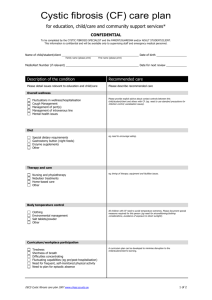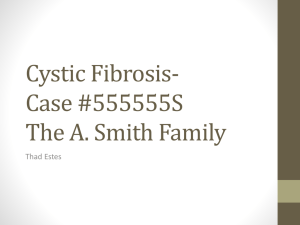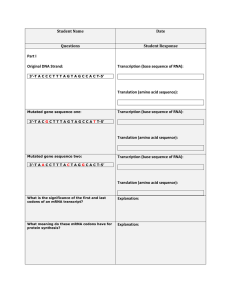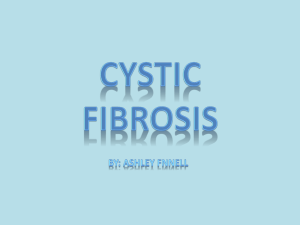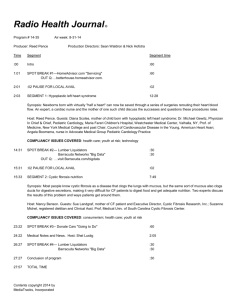Oxford Molecular Genetics Laboratory
advertisement
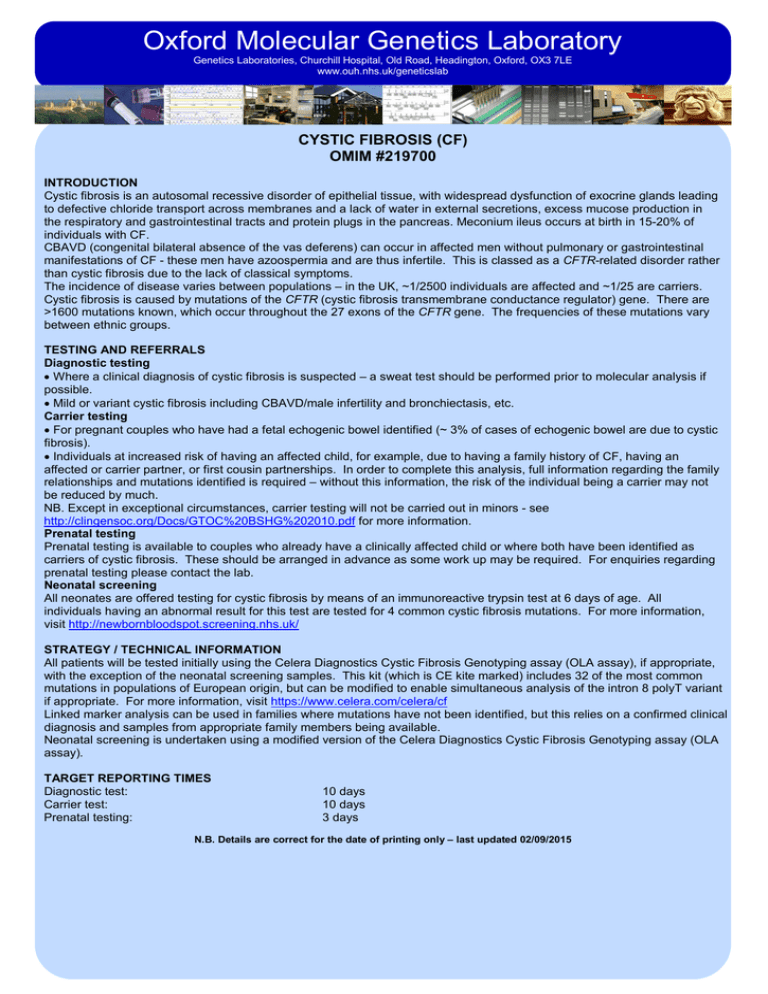
Oxford Molecular Genetics Laboratory Genetics Laboratories, Churchill Hospital, Old Road, Headington, Oxford, OX3 7LE www.ouh.nhs.uk/geneticslab CYSTIC FIBROSIS (CF) OMIM #219700 INTRODUCTION Cystic fibrosis is an autosomal recessive disorder of epithelial tissue, with widespread dysfunction of exocrine glands leading to defective chloride transport across membranes and a lack of water in external secretions, excess mucose production in the respiratory and gastrointestinal tracts and protein plugs in the pancreas. Meconium ileus occurs at birth in 15-20% of individuals with CF. CBAVD (congenital bilateral absence of the vas deferens) can occur in affected men without pulmonary or gastrointestinal manifestations of CF - these men have azoospermia and are thus infertile. This is classed as a CFTR-related disorder rather than cystic fibrosis due to the lack of classical symptoms. The incidence of disease varies between populations – in the UK, ~1/2500 individuals are affected and ~1/25 are carriers. Cystic fibrosis is caused by mutations of the CFTR (cystic fibrosis transmembrane conductance regulator) gene. There are >1600 mutations known, which occur throughout the 27 exons of the CFTR gene. The frequencies of these mutations vary between ethnic groups. TESTING AND REFERRALS Diagnostic testing • Where a clinical diagnosis of cystic fibrosis is suspected – a sweat test should be performed prior to molecular analysis if possible. • Mild or variant cystic fibrosis including CBAVD/male infertility and bronchiectasis, etc. Carrier testing • For pregnant couples who have had a fetal echogenic bowel identified (~ 3% of cases of echogenic bowel are due to cystic fibrosis). • Individuals at increased risk of having an affected child, for example, due to having a family history of CF, having an affected or carrier partner, or first cousin partnerships. In order to complete this analysis, full information regarding the family relationships and mutations identified is required – without this information, the risk of the individual being a carrier may not be reduced by much. NB. Except in exceptional circumstances, carrier testing will not be carried out in minors - see http://clingensoc.org/Docs/GTOC%20BSHG%202010.pdf for more information. Prenatal testing Prenatal testing is available to couples who already have a clinically affected child or where both have been identified as carriers of cystic fibrosis. These should be arranged in advance as some work up may be required. For enquiries regarding prenatal testing please contact the lab. Neonatal screening All neonates are offered testing for cystic fibrosis by means of an immunoreactive trypsin test at 6 days of age. All individuals having an abnormal result for this test are tested for 4 common cystic fibrosis mutations. For more information, visit http://newbornbloodspot.screening.nhs.uk/ STRATEGY / TECHNICAL INFORMATION All patients will be tested initially using the Celera Diagnostics Cystic Fibrosis Genotyping assay (OLA assay), if appropriate, with the exception of the neonatal screening samples. This kit (which is CE kite marked) includes 32 of the most common mutations in populations of European origin, but can be modified to enable simultaneous analysis of the intron 8 polyT variant if appropriate. For more information, visit https://www.celera.com/celera/cf Linked marker analysis can be used in families where mutations have not been identified, but this relies on a confirmed clinical diagnosis and samples from appropriate family members being available. Neonatal screening is undertaken using a modified version of the Celera Diagnostics Cystic Fibrosis Genotyping assay (OLA assay). TARGET REPORTING TIMES Diagnostic test: Carrier test: Prenatal testing: 10 days 10 days 3 days N.B. Details are correct for the date of printing only – last updated 02/09/2015
